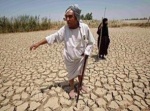 Photo: The Fertile Crescent is left dry as Turkish dams reduce the Tigris and Euphrates rivers to a trickle (AP)
Photo: The Fertile Crescent is left dry as Turkish dams reduce the Tigris and Euphrates rivers to a trickle (AP)
By Martin Chulov Asia Times
BAGHDAD – From his mud brick home on the edge of the Garden of Eden, Awda Khasaf has twice seen his country’s lifeblood seep away. The waters that once spread from his doorstep across a 20% slab of Iraq known as the Marshlands first disappeared in 1991, when Saddam Hussein diverted them east to punish the rebellious Marsh Arabs. The wetlands have been crucial to Iraq since the earliest days of civilization – sustaining the lives of up to half a million people who live in and around the area, while providing water for almost two million more.
The waters vanished after the first Gulf War due to a dictator’s wrath; over the next 16 years, they ebbed and flowed, but slowly started to return to their pre-Saddam levels. By 2007, with no more sabotage and average rains, almost 70% of the lost water had been recovered. Now it’s gone again, this time because of a crisis far more endemic: a devastating drought and the water policies of neighboring Turkey, Iran, and Syria. These three nations have effectively stopped most of the headwaters of the three rivers – the Tigris, Euphrates, and Karoon – that feed these marshes.
"Once in a generation was bad enough," says Awda, a tribal head and local sheikh in the al-Akeryah Marshlands, who also advises the Nasiriyah governorate on water issues. "Twice could well be God’s vengeance."
In a land where fundamental interpretations of monotheistic scripts often determine the tone of public discourse, particular attention is now being paid to the biblical Book of Revelation, in which drying up of the Euphrates river was prophesized as a harbinger for the end of the world. It is not doomsday yet in Iraq, but the water shortage here has not been worse for at least two centuries – and possibly for several millennia more. Government estimates suggest close to two million Iraqis face severe drinking-water shortages and extremely limited hydropower-generated electricity in a part of the country where most households , in the best of times get by on no more than eight hours of supplied power per day.
Read more at Asia Times
ATTENTION READERS
We See The World From All Sides and Want YOU To Be Fully InformedIn fact, intentional disinformation is a disgraceful scourge in media today. So to assuage any possible errant incorrect information posted herein, we strongly encourage you to seek corroboration from other non-VT sources before forming an educated opinion.
About VT - Policies & Disclosures - Comment Policy



